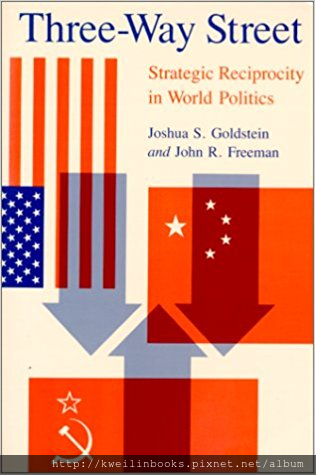Three Way Street : Strategic Reciprocity in World Politics
儘管利益衝突,世界上最強大的國家如何合作?在三路街,Joshua S. Goldstein和John R. Freeman分析了美國,蘇聯和中國在過去四十年中所確定的複雜交叉點。
作者證明,國際關係理論的三大學派 - 所有博弈論,心理學和數量 - 經驗學方法 - 都提倡採用合作倡議和相互對應的策略,以引起其他國家的合作。批評者質疑這種方法是否可以模擬國家的實際行為模式,但Goldstein和Freeman提供了大量詳細的經驗證據,顯示了1948年至1989年三國間戰略互惠的存在和有效性。具體而言,他們確立了三者之間的關係近幾十年來,各國通過“前進一步,後退一步”的模式有所改善。他們創新且非常易於理解的主要理論視角綜合闡述了國際合作的性質和運作。
How can the world's most powerful nations cooperate despite their conflicting interests? In Three-Way Street, Joshua S. Goldstein and John R. Freeman analyze the complex intersection defined by relations among the United States, the Soviet Union, and China over the past forty years.
The authors demonstrate that three major schools of international relations theory—all game-theoretic, psychological, and quantitative-empirical approaches—have all advocated a strategy that employs cooperative initiatives and reciprocal responses in order to elicit cooperation from other countries. Critics have questioned whether such approaches can model how countries actually behave, but Goldstein and Freeman provide a wealth of detailed empirical evidence showing the existence and effectiveness of strategic reciprocity among the three countries between 1948 and 1989. Specifically, they establish that relations among the three countries have improved in recent decades through a "two steps forward, one step back" pattern. Their innovative and remarkably accessible synthesis of leading theoretical perspectives brilliantly illuminates the nature and workings of international cooperation.
Joshua S. Goldstein (Autor)
Publisher:University of Chicago Press
ISBN: 978-0226301594
原價 US 15.25 台幣價 NT$550




 留言列表
留言列表


 {{ article.title }}
{{ article.title }}